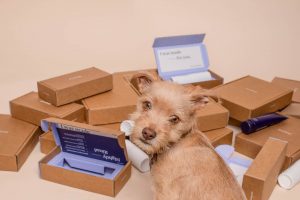Has your dog chewed on or swallowed one or more of your cigarettes? There is then a risk of nicotine poisoning. What are the signs of this poisoning in dogs? Its risks? And how to react?
Why is tobacco toxic to dogs?
Tobacco is toxic to dogs because of the nicotine it contains. In addition, this substance is a very poisonous alkaloid for the dog’s central nervous system, which works by blocking certain neuroreceptors.
In dogs, nicotine poisoning can occur when the animal ingests or chews cigarettes, rolling tobacco, cigarette butts thrown out on the street or left within reach in an ashtray on a coffee table. …
It can also occur when he wears any other nicotine products such as electronic cigarette refill cartridges or even smoking cessation products such as patches or even chewing gum.
Also, watch out for tobacco used as an ornamental plant in the garden, which is just as toxic to dogs if they swallow it.
Nicotine can also be found in particular insecticides, but cases of dog poisoning by this means are rarer and generally less severe because the doses absorbed are lower.
What are the toxic doses of nicotine in dogs?
Smokers absorb nicotine by inhalation when tobacco is consumed. Still, the amounts absorbed by a dog when it swallows tobacco are much more significant and can be responsible for acute poisoning in animals. Therefore, it would help if you did not rely on the concentrations of nicotine written on cigarette packages that correspond to the concentrations inhaled by a smoker and which are, in fact, much lower than the total quantity contained in a cigarette. This entire quantity of nicotine varies according to the type of cigarette, between 3 and 30 mg of nicotine per cigarette.
The potentially fatal dose of nicotine for a dog is 10 mg/kg of body weight, but signs of intoxication may appear at doses lower than this lethal dose. The toxicity of nicotine depends directly on the amount of nicotine absorbed by the dog.
What are the signs of tobacco poisoning in dogs?
The signs of nicotine poisoning appear very quickly within an hour of accidental ingestion of tobacco by the dog.
The signs of poisoning are digestive and nervous. Digestive disorders are manifested by hypersalivation, vomiting and diarrhoea. They can be limited to these only digestive signs if the dose of nicotine ingested by the dog is low. If nervous disorders develop, the dog may suffer from restlessness, muscle tremors, convulsions and coordination disturbances. These nervous disorders can also be complicated by the occurrence of respiratory and cardiac diseases. In very high doses, the skeletal muscles of the dog can become paralyzed and lead to the death of the animal, which, due to this paralysis, is no longer able to breathe.
Nicotine poisoning in dogs: what to do?
If your dog has swallowed tobacco or any other product containing nicotine, contact an emergency veterinary clinic.
If you cannot reach a veterinary centre, contact a veterinary poison control centre who will advise you on what to do. Four centres in France can be reached at the following numbers and times:
The Lyon CNITV: 04.78.87.10.40 – reachable 24 hours a day all year round
The Nantes CAPAE: 02. 40. 68.77.40 – reachable 24 hours a day all year round
Toulouse CAPAT: 05.61.19.39.40 – reachable from 9 a.m. to 5 p.m. every working day
The CNITV d’Alfort: 01.48.93.13. 00- reachable from 9 a.m. to 5 p.m. on working days
If you quickly take your dog to your vet after ingesting tobacco and before he shows neurological signs, he can then perform digestive decontamination of the animal using activated charcoal.
The dog will be placed under prolonged veterinary supervision requiring hospitalization, during which the veterinarian will initiate treatment to combat the symptoms of intoxication. This treatment may consist of establishing an infusion to promote the elimination of the toxicant and fight against the hypotension induced by the ingestion of nicotine and the administration of drugs to fight against vomiting, convulsions and disorders. Cardiac.
The chances of the animal’s survival from poisoning are rather good if the ingested doses of nicotine are low, but they are pretty bad if the ingested doses are high and even more so if the dog has not been cared for. By a veterinarian quickly.





